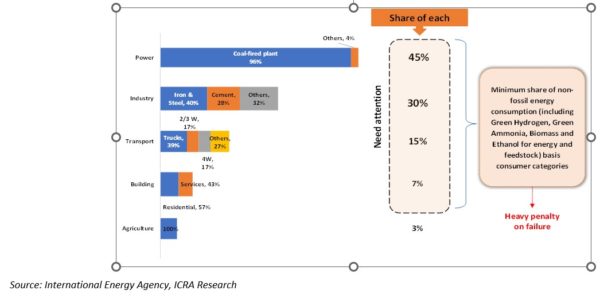ICRA Research analysts say the major amendments in the Energy Conservation Bill are a step in the right direction to decarbonize different sectors in India. The amended bill, recently passed in the lower parliament (Lok Sabha), sets a minimum usage clause for non-fossil fuel in high-emission sectors like power, industry, transport, buildings, and agriculture.
The bill also introduces carbon trading to ensure faster decarbonization of the Indian economy and help achieve sustainable development goals. It specifies the details regarding issuing authorities, entitlement, and trading details for carbon credits. ICRA Research said carbon trading can open up opportunities for India, which is the fourth largest emitter of carbon dioxide in the world.

Many states are making significant efforts to adopt the Energy Conservation Building Code and are front-runners in energy saving in commercial and public buildings. The scope of the bill has been expanded to include residential buildings, which account for 4% of carbon dioxide emissions. It also covers vehicles (as defined under the Motor Vehicles Act, 1988) and vessels (ships and boats).
“Heavy penalties and widening the scope of the types of vehicles and buildings covered would help restrict carbon emissions. The Bill has also increased the manpower of the governing council and empowered the State Electricity Regulatory Commissions (SERC)s for better control over energy transition goals. Overall, the amendment is a step in the right direction, but the execution of the same and quantifying the results to meet the climate goal vision will be a key monitorable,” said Rohit Ahuja, head of research and outreach for ICRA.
The Energy Conservation Act of 2001 provides regulations for the efficient use of energy and its conservation. It lays out regulatory, operational, legal, and financial obligations for energy-consuming equipment, appliances, buildings, and industry, to help India achieve its climate goals. To abide by India’s commitment, a policy push mandating non-fossil fuels will be critical, especially for high-emission sectors. The Energy Conservation Act Amendments are a step toward reforming the energy sector and ushering in a climate-friendly energy transition.
This content is protected by copyright and may not be reused. If you want to cooperate with us and would like to reuse some of our content, please contact: editors@pv-magazine.com.









By submitting this form you agree to pv magazine using your data for the purposes of publishing your comment.
Your personal data will only be disclosed or otherwise transmitted to third parties for the purposes of spam filtering or if this is necessary for technical maintenance of the website. Any other transfer to third parties will not take place unless this is justified on the basis of applicable data protection regulations or if pv magazine is legally obliged to do so.
You may revoke this consent at any time with effect for the future, in which case your personal data will be deleted immediately. Otherwise, your data will be deleted if pv magazine has processed your request or the purpose of data storage is fulfilled.
Further information on data privacy can be found in our Data Protection Policy.